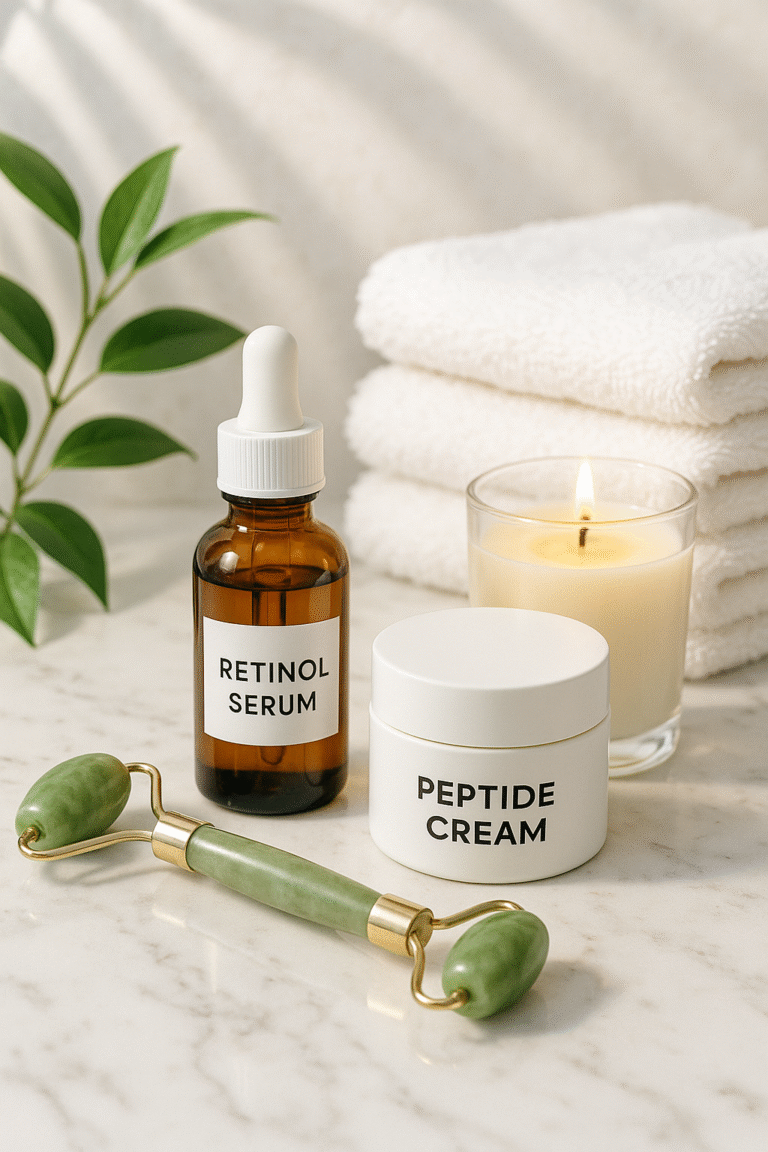The Best Anti-Aging Ingredients Backed by Dermatologists
Not all skincare ingredients are created equal—especially when it comes to fighting visible signs of aging. Fine lines, loss of firmness, dull skin, and uneven texture can all be addressed effectively, but only with the right ingredients, used consistently and correctly.
Let’s break down the top dermatologist-recommended anti-aging ingredients, how they work, what results to expect, and how to include them in your routine.
1.
Retinol and Retinoids
What it does: Speeds up cell turnover, boosts collagen, fades hyperpigmentation, and smooths fine lines.
Why it’s effective: Retinoids are the gold standard in anti-aging. They penetrate deep into the skin to increase collagen production and promote cell renewal.
Types to look for:
- Retinol: Gentler, available over-the-counter
- Retinaldehyde: More potent than retinol, still OTC
- Tretinoin (Retinoic Acid): Prescription-strength
Usage Tips:
- Apply at night
- Start slowly (1–2x per week)
- Use moisturizer to buffer irritation
- Always use broad-spectrum SPF in the morning
➡️ Learn how to safely introduce retinoids: Essential Nighttime Skincare Routine
2.
Vitamin C (L-Ascorbic Acid)
What it does: Brightens skin, neutralizes free radicals, fades dark spots, boosts collagen.
Why it’s effective: Vitamin C is a potent antioxidant that defends against environmental stressors like UV and pollution—two major causes of premature aging.
Best forms:
- L-ascorbic acid (10–20%) in stabilized formulas
- Paired with vitamin E and ferulic acid for better efficacy
Apply in the morning before sunscreen to maximize UV protection.
➡️ Curious about antioxidant layering? See: Hydration vs. Moisturization
3.
Peptides
What they do: Support skin repair, firming, and elasticity.
How they work: Peptides are short chains of amino acids that act as messengers, telling your skin to produce more collagen and elastin.
Popular types:
- Matrixyl 3000
- Argireline (acetyl hexapeptide)
- Copper peptides
Peptides are ideal for sensitive skin and pair well with most other ingredients like hyaluronic acid and niacinamide.
4.
Niacinamide (Vitamin B3)
What it does: Reduces redness, improves skin texture, minimizes pores, supports the barrier.
Anti-aging benefit: Though not a direct wrinkle-fighter, niacinamide enhances skin’s resilience, making it less prone to damage and dullness.
Use AM or PM, usually at concentrations between 5–10%. It plays nicely with retinol, vitamin C, and peptides.
➡️ For more on skin-soothing ingredients, visit: Top Ingredients to Avoid for Sensitive Skin
5.
Hyaluronic Acid
What it does: Hydrates, plumps, and smooths skin instantly.
While not an “active” in the same way as retinol, hyaluronic acid is a moisture magnet, capable of holding 1000x its weight in water.
Hydrated skin = fewer visible fine lines.
Use it daily under moisturizer to lock in hydration. Works well with peptides, niacinamide, and ceramides.
6.
Ceramides
What they do: Strengthen the skin barrier, lock in moisture, and protect from irritants.
As we age, natural ceramide levels drop, making skin more prone to dryness and wrinkles. Replenishing them helps restore skin’s integrity.
Look for moisturizers or serums with:
- Ceramide NP
- Cholesterol
- Fatty acids
Perfect for anyone using retinoids or exfoliants to avoid barrier disruption.
7.
Alpha Hydroxy Acids (AHAs)
What they do: Exfoliate dead skin cells, smooth texture, fade pigmentation.
AHAs like glycolic acid and lactic acid gently resurface the skin, making it appear smoother and brighter.
Use 1–3x per week in the evening. Avoid overuse and always follow with SPF the next day.
➡️ Need a breakdown of all exfoliants? Read: AHA vs. BHA vs. PHA
8.
Coenzyme Q10 (CoQ10)
What it does: Antioxidant protection, supports cellular energy and repair.
Levels of CoQ10 decline with age, and topical application may help combat oxidative stress and reduce the depth of wrinkles over time.
Often found in creams and serums, especially in Japanese and Korean skincare.
9.
Bakuchiol
What it does: Natural alternative to retinol—anti-aging, anti-inflammatory, and antioxidant.
Great for:
- Sensitive skin types
- Pregnant or breastfeeding individuals avoiding retinoids
Though not as potent as retinoids, bakuchiol offers visible skin benefits with minimal irritation.
10.
Sunscreen (Broad-Spectrum SPF)
No anti-aging routine is complete without daily SPF. UV exposure is the #1 cause of premature aging—wrinkles, spots, loss of elasticity.
Dermatologists recommend:
- SPF 30+
- Broad spectrum (UVA + UVB)
- Daily use, even on cloudy days
➡️ See our sunscreen guide: How to Choose the Right Sunscreen for Your Skin Type
How to Layer These Ingredients Effectively
| Time | Step | Ingredients |
|---|---|---|
| AM | Cleanse | – |
| Antioxidant Serum | Vitamin C, Niacinamide, CoQ10 | |
| Moisturizer | Peptides, Hyaluronic Acid, Ceramides | |
| Sunscreen | SPF 30+ | |
| PM | Double Cleanse | – |
| Treatment Serum | Retinol or AHA (alternate nights) | |
| Barrier Serum | Peptides, Niacinamide | |
| Moisturizer | Ceramides, Squalane, Hyaluronic Acid |
Summary: Must-Have Anti-Aging Ingredients
- Retinoids – Cell renewal and collagen boost
- Vitamin C – Brightening and antioxidant defense
- Peptides – Firmness and wrinkle reduction
- Niacinamide – Barrier support and texture refinement
- Hyaluronic Acid – Hydration and plumping
- Ceramides – Moisture retention and barrier repair
- AHAs – Exfoliation and radiance
- Sunscreen – UV protection (non-negotiable!)
Consistency is everything. Anti-aging skincare isn’t about miracles—it’s about evidence-based, long-term care.
Internal Links:
- Essential Nighttime Skincare Routine
- How to Choose the Right Sunscreen for Your Skin Type
- AHA vs. BHA vs. PHA
- Top Ingredients to Avoid for Sensitive Skin
- Hydration vs. Moisturization


